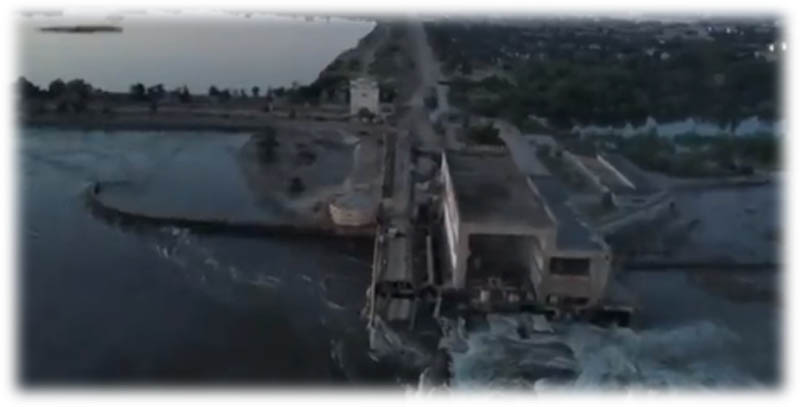 Ukraine Russia
Ukraine Russia
Dam blown up in Russia-held Ukraine city Nova Kakhovka, evacuation underway amid flooding
A dam, which is located in the Russian-controlled area of southern Ukraine, has been destroyed, leading to flooding and an exchange of words between the two nations.
Ukraine's military and Nato have accused Russia of blowing up the dam, while Russia has blamed Ukraine, reports BBC.
A large number of people have been evacuated from the area.
The Kakhovka Hydroelectric Power Plant is in the city of Nova Kakhovka in Ukraine's Kherson region, which is currently under Russian occupation, reports BBC.
It's unclear when exactly the dam was first damaged, but satellite images verified by the BBC suggest its condition has deteriorated over a number of days.
A road across the dam appears to be damaged from 2 June, but there does not seem to be a change to the flow of the water until 6 June when the breach of the wall and collapse of nearby buildings can be clearly seen on video. It is currently unclear whether the damage to the road is linked to the 6 June breach, the British media reported.
The head of the Kherson region, Oleksandr Prokudin, told Ukrainian TV this morning that eight villages had been fully or completely flooded already, with more expected to be flooded, BBC reported.
It's not yet clear what caused the breach in the dam, but Ukraine's military has accused Russia of deliberately blowing it up. This seems plausible, as Moscow may have feared that Ukrainian forces would use the road over the dam to get troops across the river into Russian-held territory, as part of a counter-offensive, the British media reported.
What did Ukraine say?
Ukraine President Volodymyr Zelenskyy described the incident as a 'Russian act of terrorism'.
This is just one day of Russian aggression. This is just one Russian act of terrorism. This is just one Russian war crime. Now Russia is guilty of brutal ecocide. Any comments are superfluous.
— Володимир Зеленський (@ZelenskyyUa) June 6, 2023
The world must react. Russia is at war against life, against nature, against… pic.twitter.com/CUd1UNmcW5
He tweeted: "This is just one day of Russian aggression. This is just one Russian act of terrorism. This is just one Russian war crime. Now Russia is guilty of brutal ecocide. Any comments are superfluous."
"The world must react. Russia is at war against life, against nature, against civilization. Russia must leave the Ukrainian land and must be held fully accountable for its terror," he said.
In its statement, Ukraine's Foreign Ministry said: "We consider the Russian Federation's detonation of the dam of the KHPP as a terrorist act against Ukrainian critical infrastructure, which aims to cause as many civilian casualties and destruction as possible."
"The terrorist attack on the Kakhovka HPP was previously intensely discussed at the level of the occupation forces in the Kherson region and propagandists on Russian television, which indicates that it was planned in advance," read the statement.
"The explosion of the dam of the Kakhovka HPP is an ecological and technological act of terrorism, the biggest technological disaster in Europe in recent decades, yet another example of Russia's genocide against Ukrainians. This is the Kremlin's response to countries calling for peace talks with the Russian Federation," the statement said.
"Due to the decrease in the water level in the Kakhovka Reservoir, there is also a danger of an incident at another critical infrastructure facility occupied by Russia - the Zaporizhzhia Nuclear Power Plant," read the statement.
UN reaction:
Interestingly, The head of the UN nuclear watchdog has warned that lack of cooling water at the Zaporizhzia nuclear plant could disrupt its emergency diesel generator.
" Absence of cooling water in the essential cooling water systems for an extended period of time would cause fuel melt and inoperability of the emergency diesel generators," read a statement issued by Rafael Grossi of the International Atomic Energy Agency.
"However, our current assessment is that there is no immediate risk to the safety of the plant," he said.
He said: "The IAEA staff on the site have been informed that the damage to the Nova Kakhovka dam is currently leading to about 5 cm/hour reduction in the height of the reservoir. The team continues to monitor this rate and all other matters on the site."
He said: "The main line of cooling water is fed from the reservoir and pumped up through channels near the thermal power plant to the site. It is estimated that the water through this route should last for a few days."
He said: "Water in the reservoir was at around 16.4 m at 8 am. If drops below 12.7 m then it can no longer be pumped."
Support Our Journalism
We cannot do without you.. your contribution supports unbiased journalism
IBNS is not driven by any ism- not wokeism, not racism, not skewed secularism, not hyper right-wing or left liberal ideals, nor by any hardline religious beliefs or hyper nationalism. We want to serve you good old objective news, as they are. We do not judge or preach. We let people decide for themselves. We only try to present factual and well-sourced news.







